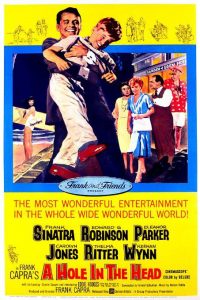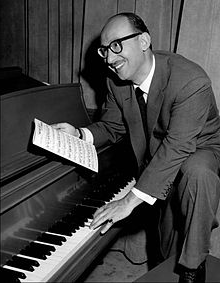By Jochen Markhorst
 A Hole In The Head (1959) is a rather melodramatic movie by legend Frank Capra in which co-producer Sinatra plays the leading role, Tony Manetta.
A Hole In The Head (1959) is a rather melodramatic movie by legend Frank Capra in which co-producer Sinatra plays the leading role, Tony Manetta.
Tony is a widower, owner of a small hotel in Miami, an irresponsible spendthrift and father of a twelve-year-old son, Ally. He has to tell his son that he has lost all his money and that they are going to be homeless. A difficult conversation, which he then opens with the words Come here son. I think we better talk this over.
That phrase is not the only thing that resonates with Dylan. Of course Frank Sinatra also sings: the song “High Hopes” is not only one of his biggest hits, but also wins the Oscar for Best Original Song and in 2008 it is on the play list of Dylans Theme Time Radio Hour. The song is recorded at Capitol Studios in Hollywood, where Dylan records his Sinatra album Shadows In The Night in 2014, and in 2016 and 2017 its successors (Fallen Angels and Triplicate).
 Lyricist Sammy Cahn, one of Sinatra’s regular song suppliers and to whom Ol ‘Blue Eyes also owes the Oscar winners “Three Coins In The Fountain” (1954) and “All The Way” (1957), explores in “High Hopes” the power of the middle rhyme, the rhyme variant with rhyming words in the same verse, in combination with end rhyme. A clever move; it elevates the somewhat foolish song (music: Jimmy Van Heusen, another purveyor to Sinatra), though it is still not Shakespeare:
Lyricist Sammy Cahn, one of Sinatra’s regular song suppliers and to whom Ol ‘Blue Eyes also owes the Oscar winners “Three Coins In The Fountain” (1954) and “All The Way” (1957), explores in “High Hopes” the power of the middle rhyme, the rhyme variant with rhyming words in the same verse, in combination with end rhyme. A clever move; it elevates the somewhat foolish song (music: Jimmy Van Heusen, another purveyor to Sinatra), though it is still not Shakespeare:
Anyone knows an ant, can’t
Move a rubber tree plant,
And as another example of the same…
No one could make that ram, scram
He kept buttin’ that dam.
In terms of content, it is corny talk with a high Dr Seuss-quality, obviously. But the form appeals to a rhyme maestro with a weakness for Spielerei. In “We Better Talk This Over” every couplet ends with a middle rhyme. Dylan wants to express a larger emotion than Sinatra and therefore does not resort to nonsense, but nevertheless lets form prevail, occasionally:
Let’s call it a day, go our own different ways
Before we decay,
does not exactly fit the song theme perfectly. Decay fits in with the dark gloominess that is the setting in “Every Grain Of Sand”, or in the fall of life of “Cold Irons Bound”, but in a lover’s swan song it sounds too exaggerated.
And of course, the end of a love affair is the theme. With some knowledge of Dylan’s private problems, it is not too astute to deduce that his divorce at the very least contributed to the inspiration. Biographer Clinton Heylin drew up sketches of the song in which a few even more intimate details of that divorce are revealed: the attempt of the singer to shut the door on lawyers.
We don’t need any back seat drivers
Hypocrites, meddlers or cheap connivers
Both of us are survivors
Don’t be confused, you’ll only be used
We can work this out, there is no doubt,
Without having to shout
Notify yr new adviser
That yr not greedy & I’m not a miser
It does not quite fit yet, the meter is still a bit abrasive, but the drift is clear. Too clear, perhaps – Dylan apparently does not want the whole thing to be an Open Letter to Sara, and deletes the all-too-clear references to any juridical tug-of-war. What remains, is universal enough to be timeless, inspired enough to seem private.
This end result is a glamourous, beautiful song, with flashes of poetic genius especially in the category Rhyme, Rhythm and Reason. Just like in “True Love Tends To Forget”, the predecessor on Street Legal, the inspired poet finds synergy, the added beauty when those three forces coincide. I took a chance, got caught in a trance of a downhill dance is such a verse where everything is right: metrically it runs like a charm, the rhyme is enchanting and with regard to content the words express the feelings of the confused, uncertain lover.
The word choice stands out. Dylan never uses words like ‘liable’, ‘erase’, the deleted ‘connivers’ or ‘transition’, and phrases like ‘low-down’, ‘two-faced’ or ‘double-dealing’ rarely if ever. In his Dylan’s Visions Of Sin (2004), Professor Christopher Ricks makes a point of the equally exceptional ‘somewheres’ (as opposed to somewhere), once again drawing his usual excessive conclusions. What escapes him is the influence of Woody Guthrie’s Bound For Glory (1943), the autobiography that in Dylan´s library is on the same pedestal as the Bible and Kerouacs On The Road:
“I went through it from cover to cover like a hurricane, totally focused on every word, and the book sang out to me like the radio. Guthrie writes like the whirlwind and you get tripped out on the sound of the words alone. Pick up the book anywhere, turn to any page and he hits the ground running. (…) Bound for Glory is a hell of a book. It’s huge. Almost too big.”
(Chronicles chapter 5, River Of Ice)
… and wherever you open the book, you can see the influence on Dylan. Like the word choice; ‘Low-down’, for example. And it also explains where that folksy ‘somewheres’ comes from, as at the end of chapter IX, A Fast-Running Train Whistles Down:
“Shut you mouth!” Roy doubled up both fists and raved back at me, and his eyes blazed wildfire. “You little rat!”
I set down close to the stove against the wall and heard Grandma say, “Where—how is Nora!”
Warren was listening, swallowing hard.
“She’s on the westbound passenger train.” Roy slid down on the floor beside me and fumbled with a burner on the wreck of a stove.
“On her way to the insane asylum.”
Nobody said very much.
Away off somewheres we heard a long gone howl of a fast-running train whistling down.
The Dylan fan recognizes four, five fragments of text in such a short piece. Nobody said very much Dylan repeats literally in “Clothes Line Saga”, the burner on the stove comes along in “Tangled Up In Blue”, the passenger train in “Honey, Allow Me Just One More Chance”, and idiom like insane asylum, wildfire, howl, fumble or raved can also be found in Dylan’s catalog. And that weird ‘somewheres’.
The music turns out just as well. The intro is pleasantly hesitant and searching, the arrangement finds a wonderful middle ground between tight and casual and Dylan, after “True Love Tends To Forget”, once again succumbs to the beauty of a successful middle-eight, of a bridge. It is even played four times and thus actually gets the status of a chorus. Under the skin, the song has a vague country atmosphere, with special thanks to guitarist Billy Cross, who is inspired by the Bakersfield sound of – above all – Buck Owens, one of Dylan’s old heroes.
Beautiful lyrical finds, beautiful music, but nevertheless “We Better Talk This Over” shares the fate of almost all Street Legal songs (“Señor” is the exception): after 1978 it disappears into the ghetto, Dylan does not perform it anymore. Yes, one more time: to the surprise of everything and everyone the bard pulls the song out at the late performance in Anaheim, March 10, 2000.
The master just keeps on giving, that particular day; in the early performance, he delighted the audience with two scoops, “Things Have Changed” and the forgotten gem “Tell Me That It Isn’t True”, which had to wait thirty-one years for the live debut. This also applies to another Nashville Skyline shelf warmer, for “Country Pie”, which debuts at the late performance.
The one-off execution of “We Better Talk This Over” is beautiful. Guitarist Charlie Sexton also is familiar with the twangy Bakersfield sound, Dylan is not entirely true to the original lyrics, sings passionately though, the audience is enthusiastic, but that is apparently not enough to convince the master – he contents himself with this one single revival of Street Legal Revisited.
What else is on the site
You’ll find an index to our latest posts arranged by themes and subjects on the home page. You can also see details of our main sections on this site at the top of this page under the picture.
The index to the 500+ Dylan compositions reviewed is now on a new page of its own. You will find it here. It contains reviews of every Dylan composition that we can find a recording of – if you know of anything we have missed please do write in.
We also have a discussion group “Untold Dylan” on Facebook. Just type the phrase “Untold Dylan” in, on your Facebook page or follow this link
And please do note The Bob Dylan Project, which lists every Dylan song in alphabetical order, and has links to licensed recordings and performances by Dylan and by other artists, is starting to link back to our reviews

Yes, and the rhyme rhythms of Cole Porter come to mind as well.
I agree.
“I’m sure that if,
I took even one sniff,
It would bore me terrifically, too.”
or
“When you hear that Lady Mendl standing up
Now turns a handspring landing up –
On her toes,
Anything goes.”
Very catchy word Spielerei
Saddle me up my big white goose
Tie me on’er, turn’er loose
Oh me, oh my
Love that coun-tree pie